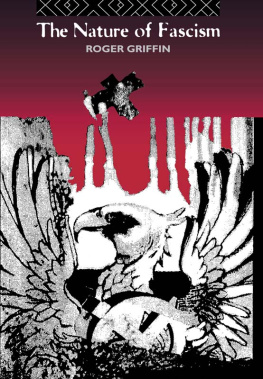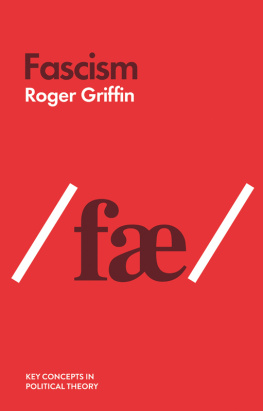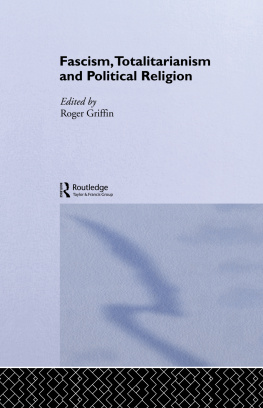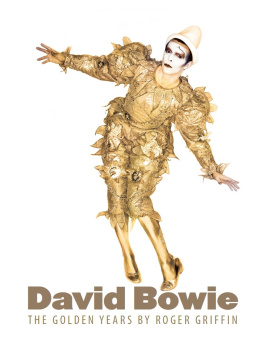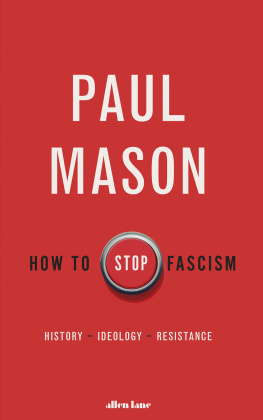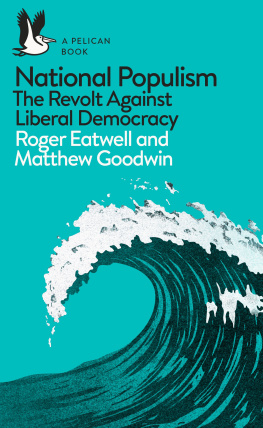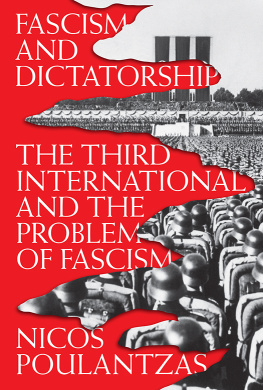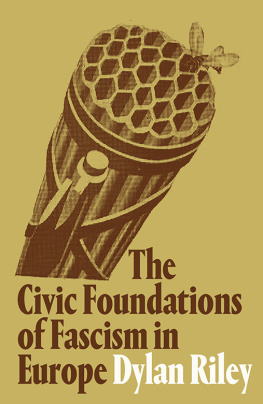Roger Griffin - The Nature of Fascism
Here you can read online Roger Griffin - The Nature of Fascism full text of the book (entire story) in english for free. Download pdf and epub, get meaning, cover and reviews about this ebook. year: 1991, publisher: Palgrave Macmillan, genre: Politics. Description of the work, (preface) as well as reviews are available. Best literature library LitArk.com created for fans of good reading and offers a wide selection of genres:
Romance novel
Science fiction
Adventure
Detective
Science
History
Home and family
Prose
Art
Politics
Computer
Non-fiction
Religion
Business
Children
Humor
Choose a favorite category and find really read worthwhile books. Enjoy immersion in the world of imagination, feel the emotions of the characters or learn something new for yourself, make an fascinating discovery.
- Book:The Nature of Fascism
- Author:
- Publisher:Palgrave Macmillan
- Genre:
- Year:1991
- Rating:3 / 5
- Favourites:Add to favourites
- Your mark:
- 60
- 1
- 2
- 3
- 4
- 5
The Nature of Fascism: summary, description and annotation
We offer to read an annotation, description, summary or preface (depends on what the author of the book "The Nature of Fascism" wrote himself). If you haven't found the necessary information about the book — write in the comments, we will try to find it.
The Nature of Fascism — read online for free the complete book (whole text) full work
Below is the text of the book, divided by pages. System saving the place of the last page read, allows you to conveniently read the book "The Nature of Fascism" online for free, without having to search again every time where you left off. Put a bookmark, and you can go to the page where you finished reading at any time.
Font size:
Interval:
Bookmark:
The Nature of Fascism
The Nature of Fascism
Roger Griffin

First published in Great Britain in 1991
by Pinter Publishers Limited
Reprinted 1993
by Routledge
2 Park Square, Milton Park, Abingdon, Oxon, OX14 4RN
Simultaneously published in the USA and Canada
by Routledge
270 Madison Ave, New York NY 10016
Transferred to Digital Printing 2006
Roger Griffin
Typeset by Florencetype Ltd, Kewstoke, Avon
All rights reserved. No part of this book may be reprinted or reproduced or utilized in any form or by any electronic, mechanical, or other means, now known or hereafter invented, including photocopying and recording, or in any information storage or retrieval system, without permission in writing from the publishers.
British Library Cataloguing in Publication Data
A catalogue reference for this book is available from the British Library.
ISBN 0-415-09661-8
Library of Congress Cataloguing in Publication Data has been applied for.
ISBN 0-415-09661-8
Publisher's Note
The publisher has gone to great lengths to ensure the quality of this reprint but points out that some imperfections in the original may be apparent
For Mariella
There are moments when from above the horizon of the mind a new constellation dazzles the eyes of all those who cannot find inner peace, an annunciation and storm-siren betokening a turning point in world history, just as it once did for the kings from the East. From this point on the surrounding stars are engulfed in a fiery blaze, idols shatter into shards of clay, and everything that has taken shape hitherto is melted down in a thousand furnaces to be cast into new values.
The epiphany to which the German Ernst Jnger was alluding here on the first page of his novel, Battle as Inner Experience, was bound up with his personal experience of front-line combat during the First World War. However, his words express a central component of all revolutionary sentiment: that privileged moment when frustration and despair in the contemporary state of human affairs are suddenly transfigured into the visionary sense of an imminent metamorphosis, a new world.
There is no need to be a modern Nostradamus to predict that all societies which operate the Judaeo-Christian scheme of historical time will, as the year 2000 approaches, be rife with speculations about the immediate fate of the world. Prophets of doom will vie with Utopian futurologists in announcing competing visions of decadence and renewal as our fin de sicle gives way to the third millennium, a prospect laden with mythic force even for modern minds. The collective sense of an historical watershed can only be reinforced by a number of major transformations in the perceived and objective structures of world society: the rise of fundamentalist, separatist and tribal nationalisms; the overthrow or dissolution of oppressive state communisms through revolutionary and gradualist democratic movements; the proposal of a new world order safeguarded by a United Nations which finally lives up to the visionary ideals which led to its foundation; the growing realization of how imminent ecological catastrophe might be, and the efforts to transform a suicidal and biocidal modern civilization into an indefinitely sustainable framework for all terrestrial life, including that of our own species. To say that humanity is at a crossroads may for once not be a piece of ethnocentric rhetoric.
At such a time it may well be asked if an investigation into the nature of fascism can really justify the intellectual, publishing and paper resources expended on it. After all, if by fascism we mean Fascism and Nazism and movements which sought to emulate them, it comprehensively failed in its bid to lay the foundations of a post-liberal society immune from the evils which it attributed to liberalism and socialism, despite the horrendously destructive persecutions and wars it unleashed. The New Order in which nations would be refounded on healthy principles and the New Man who would inhabit it remained a chimera. In the immediate aftermath of the Second World War it was only too natural that the human sciences devoted considerable resources to explaining the meteoric trajectory traced by Nazism and Fascism before they both burnt out and to investigating kindred movements which had not achieved power but were symptoms of the same international crisis. Half a century on, in an age dominated by dreams, not of the reborn national community but the international one, does a preoccupation with the definition and dynamics of fascism have any direct relevance except as a contribution to a well-established sub-discipline of history already overflowing with data and theories?
It is one of the premises underlying this book that it is precisely in the turbulent social and ideological climate of the late twentieth century that the dynamics of fascism and the place it occupies in the unfolding of modern history can best be understood by the non-fascist. Fascism was no freak display of anti-modernism or of social pathological processes in the special paths of development followed by a few nation-states. Its raw materials were such forces as militarism, racism, charismatic leadership, populist nationalism, fears that the nation or civilization as a whole was being undermined by the forces of decadence, deep anxiety about the modern age and longings for a new era to begin, all of which are active ingredients in contemporary history. What made it possible for these ingredients to be forged together into popular, and even mass movements in the inter-war period and for two of them, Fascism and Nazism, eventually to erect a new type of single party state, was an extraordinary conjuncture of acute socio-political tensions resulting directly or indirectly from the First World War and the Russian Revolution. Fascism is thus very much a child of the twentieth century. At a time when ethnic nationalisms are displaying increasing virulence, and even the most dispassionate armchair politician or contemporary historian is torn between premonitions of cataclysm and hopes of a new dawn, it makes smaller demands on the historical imagination to understand the perverse mythic logic which underlies the fascist project of destroying the old order so that the nation can be created anew.
Hopefully it will be shown that when the elusive fascist minimum is defined strictly in terms of the reborn nation and the post-liberal society which will supposedly underpin it, the resulting ideal type is not only more concise and elegant than those formulated to date but provides new insights into the dynamics of individual fascist movements. Clearly, a book on the nature of fascism written on this basis will be an exercise in the applied history of ideas. As such it will pay the scantiest attention to the myriad events in which each fascist movement is enmeshed or the particular sociopolitical and economic factors which facilitate or inhibit its success, but will instead focus on the core ideology of fascism. Given the vast range of diverse phenomena in which this ideology manifests itself, the text which results will necessarily be short on detail and original research but long on theorizing and judgments based on secondary sources.
. (Incidentally, all translations of quotations or passages taken from books published in languages other than English are my own.) The result is a book which as far as its register and format are concerned, addresses itself primarily to undergraduates, non-academic researchers and to sixth-form or high school teachers, as well as to postgraduates and (more hesitantly) experts working in this field. Obviously these represent two quite different constituencies of readers. The first will clearly need to avail themselves of secondary works on some of the phenomena which I treat so schematically, as well as of rival generic theories, if they are to gain an adequate grasp of specific aspects of the many issues I touch on and a rounded view of the debate as a whole. I trust that the abundant (but far from exhaustive) bibliographical references to (mainly English-language) sources will be helpful to this end. The second group will be acutely aware of the contentiousness of the theory I develop and the considerable simplifications and omissions which its exposition has necessitated. I would be very grateful, both for my own research purposes and for the sake of improving any revised edition that might be contemplated, if readers of either category would write to me personally care of the Humanities Department of Oxford Polytechnic to point out sections of the argument which are confusing or obscure, to put me right on particularly disturbing empirical gaffes and lapses or to point out material which might corroborate or refine my thesis on fascism but of which I seem to be oblivious.
Next pageFont size:
Interval:
Bookmark:
Similar books «The Nature of Fascism»
Look at similar books to The Nature of Fascism. We have selected literature similar in name and meaning in the hope of providing readers with more options to find new, interesting, not yet read works.
Discussion, reviews of the book The Nature of Fascism and just readers' own opinions. Leave your comments, write what you think about the work, its meaning or the main characters. Specify what exactly you liked and what you didn't like, and why you think so.

